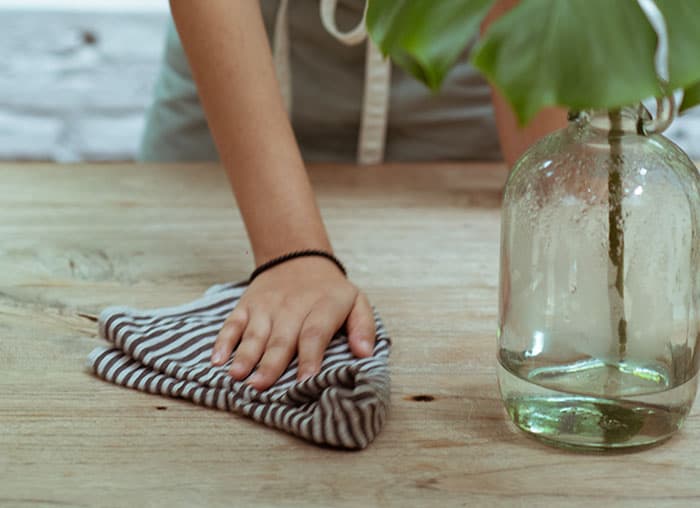Cleaning with products that don’t contain toxic chemicals is known as green cleaning. This environmentally friendly approach to cleaning has a number of benefits, including protecting the environment, reducing health risks, and improving indoor air quality.
The good news is that you can still disinfect and clean surfaces without strong chemicals. It’s even possible to make your own green cleaning products with household ingredients that you probably have at home.
Why Switch to Green Cleaning?
Standard household cleaners usually contain chemicals that can be harmful to humans and animals. Common health impacts include respiratory and skin issues, allergies, reproductive harm, and some cancers.

Standard soaps that kill bacteria may cause harm to the immune system as well. Chemicals can also harm the environment during the manufacturing process, when they’re applied to some surfaces, and when you dispose of them.
General Green Cleaning Tips
When you want to make a switch to green cleaning, look for products labeled as nontoxic, biodegradable, and phosphate-free. Products with natural fragrances will usually contain fewer chemicals. Choose products that don’t contain dyes, hypochlorite, or chlorine.
Bulk packaging and products packaged in containers made of recycled content are better choices for the environment as well. As you read product labels, choose products that fully disclose all ingredients so you can know the potential environmental impacts.

Instead of purchasing green cleaning products, you can also make your own cleaners at home. Homemade cleaners are inexpensive to make, you know exactly what ingredients are in them, and they tend to produce effective cleaning results.
A simple mixture of white vinegar and water will clean windows and mirrors, and baking soda and water makes an effective scouring agent for stainless steel sinks.
Green Cleaning in the Kitchen
Switching to green cleaning methods in the kitchen doesn’t have to involve lowering your cleanliness standards. One of the first things to change when you want to go green is your use of paper towels. Instead of using this consumable product, switch to reusable towels made of bamboo.

Try using lemon juice to disinfect and cut grease, use white vinegar to disinfect some surfaces, and scrub with baking soda when you need something more abrasive. But be sure to check manufacturer recommendations for cleaning surfaces such as granite and marble before using these methods.
Green Cleaning in the Garage
Clearing out environmental hazards from the garage will help you reduce your negative impact on the planet. Take inventory of your items, and choose the products you want to discard. Before you throw anything away, learn about local guidelines for waste disposal.

You may need to dispose of some products at a special facility. Repurpose items when you can. If you don’t have a use for some things anymore, give them away or resell them instead of throwing them away.
After decluttering, organize your garage items using containers you already own. Glass jars are ideal for holding nails and screws, and pegboards with hooks can help you store items vertically.
Green Cleaning in the Yard
Green cleaning outside of your house and in the yard is also possible. If your siding is dirty, clean it with plain water and a pressure washer. Don’t wash your driveway, as this tends to push dirt and debris down into the storm drains.

Use lint-free cloths with white vinegar and water to clean windows. You can also tackle tough grill grease with a simple paste of baking soda and water. Keep outdoor furniture clean with a mixture of warm water, hydrogen peroxide, dish soap, and borax. Brush the mixture onto the furniture, then rinse it off with a hose.
Additional Resources
- Green Cleaning Guide
- Overview of Green Cleaning
- Why Green Cleaning?
- Defining Green Cleaning and Why it’s Important
- What Is Green Cleaning, and Why Is it Important for Your Business?
- What Is Green Cleaning (and Why Should You Care)?
- Identifying Greener Cleaning Products
- What Is Green Cleaning?
- Introduction to Green Cleaning
- The Environmental Impact of Cleaning Products
- Environmental Impacts of Cleaning
- Greener Cleaning Products Guide
- How Exactly Do Cleaning Supplies Affect the Environment?
- The Truth About Green Cleaning Products
- Five Environmentally Friendly Ways to Clean Your Kitchen
- Homemade Cleaning Products: Natural, Green, Eco-Friendly Solutions
- Eight Homemade Cleaners That Actually Work
- Eco-Friendly Ways to Organize and Clean Out Your Garage
- Green Cleaning Recipes
- 66 All-Natural Cleaning Solutions That Really Work
- Garage Cleaning Tips
- Going Green and Keeping Clean: Outdoor Edition
- Get a Sparkling Home With Natural Cleaning Products
- How to Make Environmentally Friendly Cleaners
- Nine Secrets to Cleaning With Herbs and Plants You May Not Know
